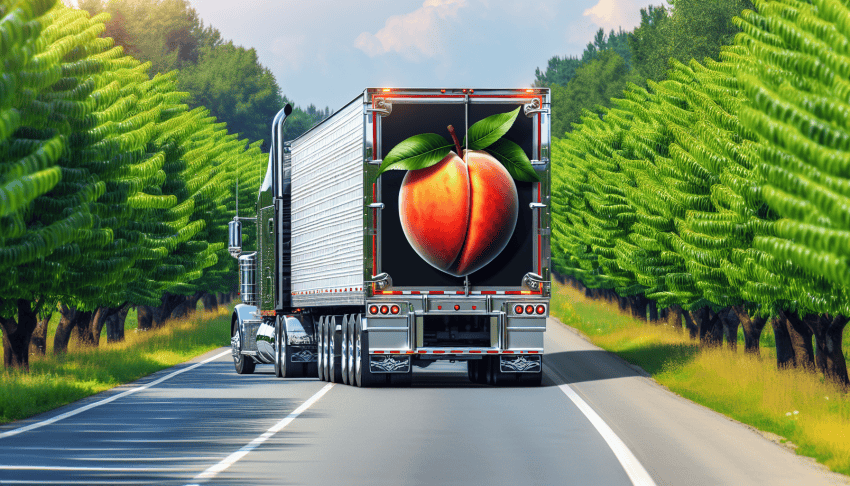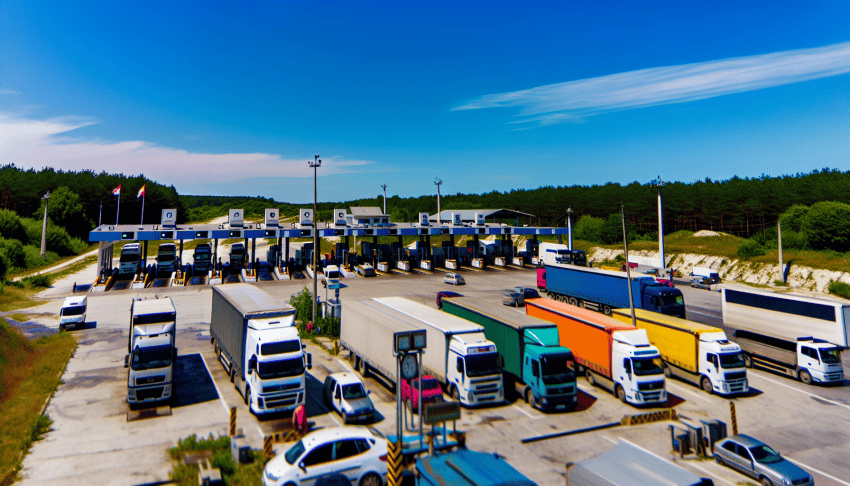4.9 Rating
Google REVIEWS
Leaders in Georgia Personal Injury Law Since 1995
What Are Georgia State and Federal Trucking Industry Laws?
Understanding Georgia state and federal trucking industry laws is key for truckers, fleet managers, and associated personnel. This straightforward guide covers the essentials from licensing to load limitations, ensuring you have the information necessary for compliance and safe operation. Grasp the legal foundation for both state and federal trucking guidelines relevant in Georgia, preparing you for detailed insights ahead.

Key Takeaways
- Georgia’s trucking regulations are enforced by the MCCD and GDOT, covering licensing, inspection standards, hours of service, weight and size restrictions, and hazardous materials transportation.
- Federal FMCSA rules complement state regulations in areas such as driving hours, drug testing, and vehicle maintenance, with specific hours of service rules to combat driver fatigue.
- Negligent practices in the trucking industry can lead to severe consequences; however, compliance with regulations and proper training can prevent accidents, and victims of truck accidents have legal recourse in Georgia.

Overview of Georgia’s Trucking Regulations
Georgia’s trucking regulations, an elaborate tapestry woven from Georgia law and federal laws, are designed to ensure safety, compliance, and fair competition. These laws are enforced by the Motor Carrier Compliance Division (MCCD) and the Georgia Department of Transportation (GDOT), ensuring that our roads remain safe and efficient for commerce.
The Georgia Department of Public Safety’s Transportation Rulebook covers a wide range of regulations for truckers and trucking companies in Georgia. Some of the key areas covered in the rulebook include:
- Licensing requirements for commercial drivers
- Vehicle inspection standards
- Hours of service regulations
- Weight and size restrictions
- Hazardous materials transportation guidelines
These regulations are designed to ensure that the wheels of commerce keep turning safely and smoothly on Georgia’s roads.
Key Federal Motor Carrier Safety Administration (FMCSA) Rules
Beyond Georgia’s state-specific rules, trucking companies and commercial drivers must also adhere to the federal trucking rules when operating commercial motor vehicles. These rules, overseen by the Federal Motor Carrier Safety Administration (FMCSA), cover a wide array of safety considerations, including:
- Driving hours
- Drug testing
- Vehicle maintenance
- Transportation of hazardous materials

Hours of Service and Driver Rest Requirements
Driving a commercial truck isn’t a typical 9-5 job. The FMCSA has established specific hours of service rules to prevent the risk of driver fatigue, a key factor in many trucking accidents. Under these regulations, truck drivers are limited to 11 hours of driving, after which a rest period of at least 10 consecutive hours is mandatory.
But the rules don’t stop there. Truck drivers are required to take a 30-minute break within the first 8 hours of their driving shift, as mandated by regulations. This break helps ensure their safety and well-being on the road. These rest requirements are more than just a break for truckers; they’re a vital element in the broader effort to ensure safety on our roads.
Maintenance and Inspection Standards for Commercial Trucks
Maintenance and inspection standards for commercial trucks are as crucial as the rules of the road. Regular vehicle inspections, including checks on brakes, lights, and tires, are not only mandatory in Georgia but are also a key factor in ensuring the safety of both the truck driver and other road users.
Non-compliance with these maintenance standards can result in negligence if it leads to a truck crash. After all, a well-maintained commercial vehicle is not just about performance; it is a critical piece of the safety puzzle on our highways.
Substance Testing Protocols for Commercial Drivers
Substance abuse and driving do not mix, especially in the trucking industry. Commercial drivers in Georgia are expected to strictly adhere to federal drug and alcohol testing protocols. These protocols, established under 49 U.S. Code §382, prohibit commercial drivers from using alcohol or drugs while operating a vehicle.
Penalties for non-compliance with these testing requirements are severe, including suspension or revocation of the driver’s commercial driver’s license (CDL). These measures underline the serious commitment to safety in the trucking industry, ensuring that our roads remain safe for all users.

Georgia-Specific Trucking Laws for Commercial Vehicles
In addition to federal government regulations, commercial vehicles operating in Georgia must also abide by state-specific laws. These include licensing requirements for drivers, weight and dimension limits for vehicles, and mandatory stops at open weight and inspection stations.
From trailers over 3,000 lbs equipped with service brakes to the prohibition of radar detectors and restrictions on transporting alcoholic beverages, these regulations add another layer of safety and compliance in the Georgia trucking industry.
Licensing and Endorsements for Georgia Truckers
Navigating Georgia’s highways in a commercial vehicle requires more than just a standard driver’s license. Truck drivers in Georgia are required to possess a valid commercial driver’s license (CDL), issued by the state, to legally operate a commercial vehicle.
But a CDL alone isn’t always enough. For certain trucking jobs, such as transporting hazardous materials or carrying passengers, special endorsements on the CDL are required. These endorsements are more than just additional credentials; they signify the driver’s specialized training and expertise in handling specific types of commercial vehicles or cargoes.
State-Level Vehicle Weight and Dimension Limits
Size matters in the trucking industry, especially when it comes to state-level vehicle weight and dimension limits. Georgia enforces specific weight and size restrictions for commercial trucks, with a maximum weight limit of 34,000 pounds for a tandem-axle truck.
However, the state also recognizes the occasional need for exceptions. Special permits can be obtained from the Georgia Department of Transportation for the operation of oversized vehicles that exceed standard size limits. This allowance ensures the smooth transportation of oversized loads while maintaining safety on the roads.
The Impact of Negligent Truck Drivers and Trucking Companies
Negligent practices by trucking companies and drivers put more than just their operations at risk. They pose a danger to all road users, potentially resulting in severe injuries or even wrongful deaths. From non-compliance with regulations to negligent hiring practices, these oversights can dramatically increase the risk of truck accidents.

Preventing Accidents Through Compliance
Compliance with regulations is more than just ticking boxes; it’s a critical step in preventing accidents. Whether it’s adhering to hours of service regulations to prevent driver fatigue or ensuring regular vehicle inspections to spot potential issues, compliance plays a crucial role in maintaining safety on the roads. To further enhance safety, companies can implement testing rules as part of their compliance efforts.
However, compliance doesn’t just rest on the drivers. Trucking companies also have a key role to play in ensuring adherence to regulations. By providing adequate training and maintaining proper insurance coverage, they can contribute significantly to the prevention of accidents.
Legal Recourse for Victims of Truck Accidents
When accidents do happen, victims have legal recourse. In Georgia, truck accident victims can seek compensation for injuries and, in some cases, punitive damages if the accident resulted from violations of commercial vehicle regulations.
However, victims must act quickly. The statute of limitations for filing a personal injury case related to a truck accident in Georgia is generally 2 years from the date of the accident. This underscores the importance of securing qualified legal representation promptly after an accident to preserve crucial evidence and initiate legal proceedings.

Insurance and Liability in the Trucking Industry
Insurance is a vital safety net in the trucking industry. From basic liability coverage to specialized policies for trucks carrying hazardous materials, insurance requirements for commercial trucks in Georgia are designed to provide protection against the financial impact of accidents.
Nonetheless, meeting these insurance requirements is not optional. Failure to maintain appropriate insurance can result in severe penalties, including fines, suspension of vehicle registration, and revocation of the motor carrier’s operating authority.
Navigating Trucking Industry Employment
Finding employment in the trucking industry is not just about securing a job; it’s about embarking on a career path that requires responsibility, skill, and dedication. Trucking companies must perform diligent background checks and monitor performance to avoid negligent hiring practices.
Training is a crucial part of this process, equipping truck drivers with the skills necessary to handle the complexities of the role. Whether it’s transporting hazardous materials or navigating Georgia’s highways, proper training is essential to ensure that drivers are ready for the road.
The Role of Technology in Compliance and Safety
In today’s digital age, technology has become an integral part of the trucking industry. Electronic Logging Devices (ELDs) are a prime example of how technology is enhancing compliance and safety in the industry.
ELDs have revolutionized the way trucking companies track drivers’ hours of service, moving from manual record-keeping to automated, real-time tracking. This not only ensures compliance with regulations but also helps prevent driver fatigue, contributing to the safety of all road users.
Preparing for DOT Audits and Inspections
DOT audits and inspections are a regular part of life in the trucking industry. These checks are designed to ensure compliance with regulations and maintain the highest standards of safety.
Preparing for these inspections involves more than just ticking off a checklist. It requires a thorough understanding of regulations, ensuring all required documents are readily available, and keeping vehicles in proper condition. In essence, it’s about being proactive in maintaining safety and compliance.
Summary
Whether it’s navigating the intricate web of regulations, understanding the importance of compliance, or appreciating the role of technology, navigating Georgia’s trucking industry is a journey that requires vigilance, knowledge, and commitment. As we continue to rely on the trucking industry for our everyday needs, let’s ensure that safety and compliance remain our constant companions on this journey.
Frequently Asked Questions
What are the truck driving laws in Georgia?
In Georgia, short-haul truck drivers are permitted to drive for up to 11 hours after taking 10 hours off duty, and their employers must keep detailed time records for at least 6 months. These records serve as a crucial element in tracking the hours that a driver works and ensuring that they are not exceeding the legal driving limits.
This system helps to prevent driver fatigue, which is a significant factor in many vehicular accidents. Additionally, these regulations are in place to protect the well-being of the drivers and the safety of the public by preventing overworked drivers from being on the road. It’s also a measure that aids in the enforcement of the hours of service regulations, allowing for easier verification during inspections and audits.
What are the federal regulations for truckers?
Truckers need to be at least 21 years old, complete a road test, meet physical requirements, read and speak English, and hold a valid commercial motor vehicle license to comply with federal regulations. These criteria are part of a broader effort to ensure that those behind the wheel of a commercial vehicle are not only legally compliant but also possess the necessary skills and physical capability to handle the demands of the job.
The road test is designed to assess a driver’s ability to operate a commercial vehicle safely, while the physical requirements ensure that the driver can handle the rigors of long hours on the road. The language requirement is critical for understanding road signs, communicating with law enforcement, and completing necessary paperwork.
Holding a valid commercial motor vehicle license is the final stamp of approval that the driver has met all the necessary training and knowledge requirements to operate a commercial vehicle responsibly.
What department of the federal government mostly governs the trucking industry?
The Federal Motor Carrier Safety Administration (FMCSA) is the main federal government agency that governs the trucking industry.
How regulated is the trucking industry?
The trucking industry is heavily regulated by the federal government to ensure safety for drivers and the general public by standardizing baseline safety levels.
What are the hours of service regulations for truck drivers in Georgia?
Truck drivers in Georgia are limited to 11 hours of driving, followed by a mandatory rest period of at least 10 consecutive hours. This rule ensures drivers get necessary rest for safety on the road.
